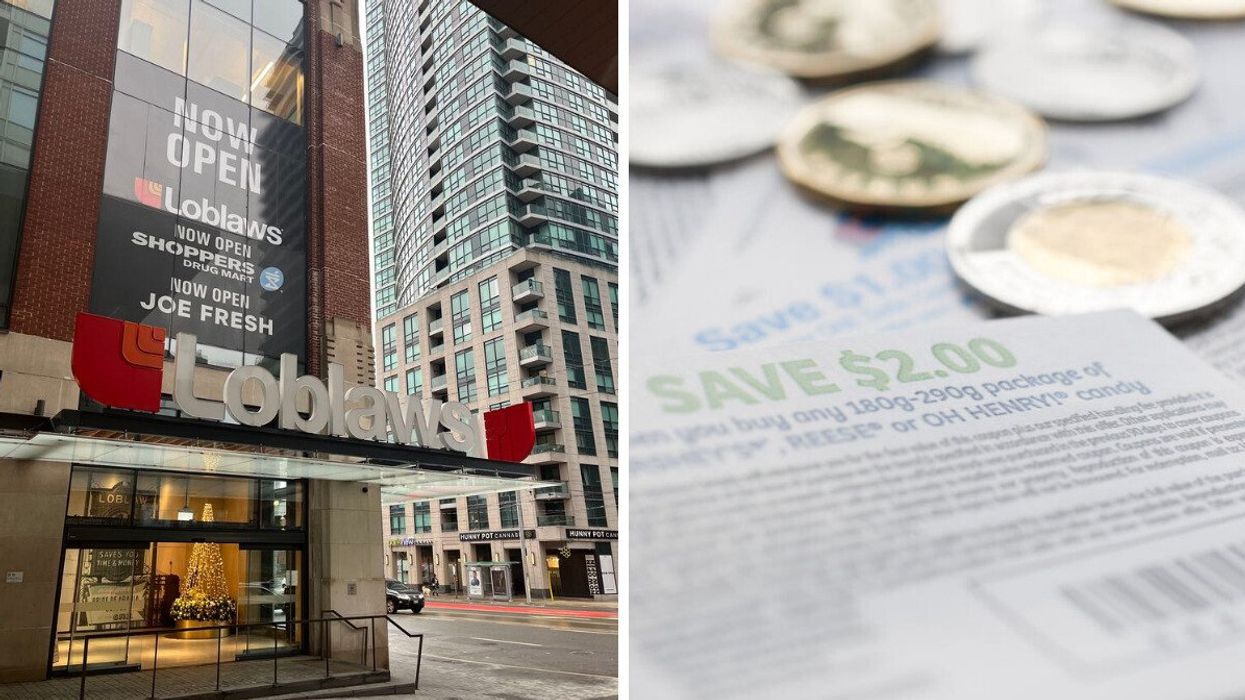Here's How To Save Some Money & Keep Your Finances From Going To Hell During The Recession
Make 2023 a little less bumpy. 💵

A Loblaws storefront in Toronto, Ontario. Right: Canadian coins and savings coupons.
With interest rates in Canada continuing to climb, many people are bracing for a financially challenging year in 2023, especially when it comes to their budget, efforts to save money, and any attempt to pay down debt.
The recession certainly can be a scary thought, especially if you aren't prepared, so whether you're a beginner budgeter or just looking to keep your financial situation from getting any worse this year, there are some easy ways to start getting on top of things.
"It can be really daunting," said Natasha Macmillan, the Director of Everyday Banking at Ratehub.ca in an interview with Narcity, referring to talk about rising costs and inflation. "It starts to get us a bit anxious of what 2023 holds and beyond."
We spoke with Macmillan to take a closer look at five ways to budget, save money and how you can keep your money from going to hell this year.
How should a beginner budget?
"There are many different ways to budget, but even just getting the lay of the land of how much you typically spend is the best way to start," said Macmillan.
Establishing a budget is the first major step you can take toward improving your personal finances, but before you do that, you need to take a look at the bigger picture of what's coming in and what's going out.
What money is coming in?
From your paychecks to any investments you might have, Macmillan said this is the easiest way to start to get a better understanding of where you are financially.
"[B]reak it down to the simplest form," said said. "Look at the income coming in from your family. So...whether you have a rental property, your income from your jobs, and just put that as your starting point."
From there, you can move on to step #2.
What money is coming out?
Here, you start with the "non-negotiables," which would be any rent or mortgage payment and all other recurring bills. Where it gets more challenging is getting a truly accurate picture of your spending on things like groceries.
"You start to think about the averages," Macmillan explained. "But what's helpful when you audit your finances is going back a few months to say, okay, I can say I would love to spend $200 a month on groceries, but when I look back, is that actually realistic?"
The truth is really in the numbers, so get your bank and credit card statements ready for this part of the process.
What is the simplest way to budget?
Once you have a solid idea of how much money you have coming in and going out every month, Macmillan explained the most popular budgeting tool to jump into is the 50/30/20 rule.
"50% of your income is earmarked towards needs, so home utilities, groceries, transportation and insurance," she said. "30% is more discretionary, so things that you don't need but you would like, (...) and then ideally the remaining 20% is savings."
Macmillan said while this budgeting method is popular, everyone's circumstances are different and the percentage of income dedicated to certain areas will vary for everyone, but saving is key.
"Always trying to put a little bit towards that is important," she said.
How do you grocery shop on a budget?
Arguably one of the hottest topics related to the cost of living in Canada right now has been the rising cost of groceries. Some off-the-chart prices for particular items have even gone viral, so there's no denying savings here could be a huge help.
Macmillan said it all starts with having a plan and making a list in advance.
"Starting with ideally a meal plan if you can (...) and sticking to it when you go to the store," she said, explaining that grocery stores do a great job of marketing their most expensive products to shoppers right at eye level, so you'll often find savings on similar products when you look higher and lower on the shelf.
Macmillan also highly recommended couponing and scanning flyers before you shop to see what's on sale, to try and even adapt any recipes accordingly in order to save.
Additionally, especially for anyone committed to couponing, there are potential savings at grocery stores that price match, if you've found a lower price on the same item elsewhere.
How do I pay off debt in Canada?
Higher interest rates don't bode well for anyone with debt. So what can you do?
While consistency is key, Macmillan shares some tips and tricks for paying down your debt a bit faster.
"Focus on at least paying the minimum balance," she explained. "That will save you significant interest costs and help you actually pay your credit card debt much sooner."
With interest rates in Canada much higher, Macmillan also recommended that anyone with debt work to pay off money that has the highest interest rate first, something often referred to as the debt avalanche method.
Finally, a balance transfer could also be a good option for anyone with credit card debt, where you move debt from one or more credit cards to another that has a much lower interest rate.
"They [credit card companies] currently have some great offers with low-interest rates where you can pay even as 0% for a certain time period," said Macmillan. "That will allow you to kind of pay off your debt faster and ideally that buys you more time to pay it off."
Overall, it takes work. But hopefully, these five tips can help you get your money situation on the right track.
"I think the key thing is just trying to, unfortunately, slog through it (and) stay positive," said Macmillan.